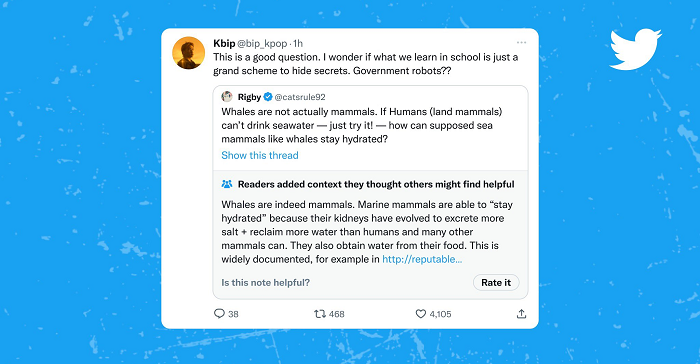SOCIAL
Twitter Expands Community Notes to More Regions

Twitter continues to expand its Community Notes feature, which Twitter chief Elon Musk believes will be a key element in establishing the platform’s new ‘Trust as a Service’ approach, and see Twitter become a more critical provider of truth in news and information.
Which is a noble aim, but how that actually plays out remains to be seen.
The latest expansion sees Community Notes moving abroad, with users in more regions now able to apply to add notes to contextual notes and reference links to questionable claims in tweets.
We are now admitting contributors from the UK ????????, Ireland ????????, Australia ???????? and New Zealand ???????? — welcome to Community Notes! Want to help? Sign up here: https://t.co/FSsqNzonnz
— Community Notes (@CommunityNotes) January 20, 2023
As per the announcement, selected users in the UK, Ireland, Australia and New Zealand will now be admitted into the Community Notes program, which will greatly expand the amount of local knowledge and input feeding into the Notes system.
Twitter’s been working to build Community Notes (formerly ‘Birdwatch’) into a form of crowd-sourced fact-checking, as a means to both reduce its internal obligations in moderating content, and to empower Twitter users themselves to decide what’s acceptable and what’s not in the app.
Approved Notes contributors are able to add contextual explainers that are then appended to tweets, with all Twitter users then able to rate notes as helpful or not, thus influencing the trustworthiness of the Note creator (and their capacity to continue adding Notes).
Which is a good experiment, though whether it’s a scalable replacement for actual, human fact-checkers and moderators is another question altogether.
Elon is pushing hard to make Community Notes a thing – which makes sense given that he’s also cut thousands of moderators as part of his cost-reduction measures.
But one of the key concerns with Community Notes is that they could potentially over-simplify complex issues, with notes that may seem right, but don’t really tell the full story.
Which is a broader problem with modern web culture. If you can explain something with a simple meme, it quickly spreads as a fact, when the world’s most divisive and challenging issues are actually far more complex than a screenshot of a cowboy telling it how it is.
Take, for example, this Community Note that Elon himself retweeted.
This is correct, egg prices are up due to avian flu – but also due to increasing costs of production, as well as higher demand. But does that justify a corporation upping its prices, and raking in more profit? They do this because they can – why would they eat the price rises from suppliers if they don’t have to – but in essence, both aspects are true, egg prices are higher because of avian flu AND corporate greed.
But that type of nuance could be restricted by a more simplified Notes system, which could then see misleading claims amplified, as opponents try to dunk on each other’s tweets.
And if you then apply the same process to even bigger issues, like, say, climate change, for which there are many complex elements, what then? What about vaccine take-up – it’s possible that you could disprove one element with a simple Note, while skipping over several other influential factors or points?
Definitely, giving users reason to pause on any potentially false claims is a positive. But when you also feel a need to make qualifying statements like this:
We are going to great lengths to avoid the Wikipedia left wing editorial control problem. By the same token, Community Notes cannot be biased towards the right either. Maximizing for truth is the goal.
— Elon Musk (@elonmusk) January 22, 2023
That seems a little concerning.
Either way, Elon sees Community Notes as part of his broader mission to make Twitter the source of truth, as ruled by, and for the people, whether that’s actually true or not.
As outlined in a recent overview by The Rabbit Hole, which Musk shared:
“To succeed as a [Trust as a Service provider], New Twitter must act as a defiant force by resisting pressure from Legacy Media to stifle conversations on its platform and by empowering citizen journalism in order to displace the role of old oligarchies in trust brokering.”
Community Notes is part of the ‘citizen journalism’ push, but as with most of Elon’s statements on this front, this also vastly overrates the perceived influence of outside forces in general media coverage, which people in positions of power, like Musk, can then use to imbue distrust, and dismiss any information that they find inconvenient.
But that’s, apparently, the mission. Which, given Twitter has lost 40% of ad revenue, and is potentially on track for bankruptcy, isn’t looking great. But maybe, through the added capacity of fact-checks via Community Notes – for which Twitter is developing a more robust solution for vetting and approving contributors – that could end up lessening the impact of false claims, while saving Twitter money in the process.
But it feels risky to put so much reliance on it so quickly.
Twitter says that it will add new Community Notes contributors in batches, as it looks to grow the contributor base by 10% per week for the immediate future.
SOCIAL
Snapchat Explores New Messaging Retention Feature: A Game-Changer or Risky Move?

In a recent announcement, Snapchat revealed a groundbreaking update that challenges its traditional design ethos. The platform is experimenting with an option that allows users to defy the 24-hour auto-delete rule, a feature synonymous with Snapchat’s ephemeral messaging model.
The proposed change aims to introduce a “Never delete” option in messaging retention settings, aligning Snapchat more closely with conventional messaging apps. While this move may blur Snapchat’s distinctive selling point, Snap appears convinced of its necessity.
According to Snap, the decision stems from user feedback and a commitment to innovation based on user needs. The company aims to provide greater flexibility and control over conversations, catering to the preferences of its community.
Currently undergoing trials in select markets, the new feature empowers users to adjust retention settings on a conversation-by-conversation basis. Flexibility remains paramount, with participants able to modify settings within chats and receive in-chat notifications to ensure transparency.
Snapchat underscores that the default auto-delete feature will persist, reinforcing its design philosophy centered on ephemerality. However, with the app gaining traction as a primary messaging platform, the option offers users a means to preserve longer chat histories.
The update marks a pivotal moment for Snapchat, renowned for its disappearing message premise, especially popular among younger demographics. Retaining this focus has been pivotal to Snapchat’s identity, but the shift suggests a broader strategy aimed at diversifying its user base.
This strategy may appeal particularly to older demographics, potentially extending Snapchat’s relevance as users age. By emulating features of conventional messaging platforms, Snapchat seeks to enhance its appeal and broaden its reach.
Yet, the introduction of message retention poses questions about Snapchat’s uniqueness. While addressing user demands, the risk of diluting Snapchat’s distinctiveness looms large.
As Snapchat ventures into uncharted territory, the outcome of this experiment remains uncertain. Will message retention propel Snapchat to new heights, or will it compromise the platform’s uniqueness?
Only time will tell.
SOCIAL
Catering to specific audience boosts your business, says accountant turned coach

While it is tempting to try to appeal to a broad audience, the founder of alcohol-free coaching service Just the Tonic, Sandra Parker, believes the best thing you can do for your business is focus on your niche. Here’s how she did just that.
When running a business, reaching out to as many clients as possible can be tempting. But it also risks making your marketing “too generic,” warns Sandra Parker, the founder of Just The Tonic Coaching.
“From the very start of my business, I knew exactly who I could help and who I couldn’t,” Parker told My Biggest Lessons.
Parker struggled with alcohol dependence as a young professional. Today, her business targets high-achieving individuals who face challenges similar to those she had early in her career.
“I understand their frustrations, I understand their fears, and I understand their coping mechanisms and the stories they’re telling themselves,” Parker said. “Because of that, I’m able to market very effectively, to speak in a language that they understand, and am able to reach them.”Â
“I believe that it’s really important that you know exactly who your customer or your client is, and you target them, and you resist the temptation to make your marketing too generic to try and reach everyone,” she explained.
“If you speak specifically to your target clients, you will reach them, and I believe that’s the way that you’re going to be more successful.
Watch the video for more of Sandra Parker’s biggest lessons.
SOCIAL
Instagram Tests Live-Stream Games to Enhance Engagement

Instagram’s testing out some new options to help spice up your live-streams in the app, with some live broadcasters now able to select a game that they can play with viewers in-stream.
As you can see in these example screens, posted by Ahmed Ghanem, some creators now have the option to play either “This or That”, a question and answer prompt that you can share with your viewers, or “Trivia”, to generate more engagement within your IG live-streams.
That could be a simple way to spark more conversation and interaction, which could then lead into further engagement opportunities from your live audience.
Meta’s been exploring more ways to make live-streaming a bigger consideration for IG creators, with a view to live-streams potentially catching on with more users.
That includes the gradual expansion of its “Stars” live-stream donation program, giving more creators in more regions a means to accept donations from live-stream viewers, while back in December, Instagram also added some new options to make it easier to go live using third-party tools via desktop PCs.
Live streaming has been a major shift in China, where shopping live-streams, in particular, have led to massive opportunities for streaming platforms. They haven’t caught on in the same way in Western regions, but as TikTok and YouTube look to push live-stream adoption, there is still a chance that they will become a much bigger element in future.
Which is why IG is also trying to stay in touch, and add more ways for its creators to engage via streams. Live-stream games is another element within this, which could make this a better community-building, and potentially sales-driving option.
We’ve asked Instagram for more information on this test, and we’ll update this post if/when we hear back.
-

 MARKETING6 days ago
MARKETING6 days agoRoundel Media Studio: What to Expect From Target’s New Self-Service Platform
-

 SEO6 days ago
SEO6 days agoGoogle Limits News Links In California Over Proposed ‘Link Tax’ Law
-
SEARCHENGINES6 days ago
Daily Search Forum Recap: April 12, 2024
-

 SEO5 days ago
SEO5 days ago10 Paid Search & PPC Planning Best Practices
-

 SEARCHENGINES5 days ago
SEARCHENGINES5 days agoGoogle Core Update Volatility, Helpful Content Update Gone, Dangerous Google Search Results & Google Ads Confusion
-

 SEO7 days ago
SEO7 days agoGoogle Unplugs “Notes on Search” Experiment
-

 MARKETING6 days ago
MARKETING6 days ago2 Ways to Take Back the Power in Your Business: Part 2
-

 PPC6 days ago
PPC6 days agoCritical Display Error in Brand Safety Metrics On Twitter/X Corrected











You must be logged in to post a comment Login